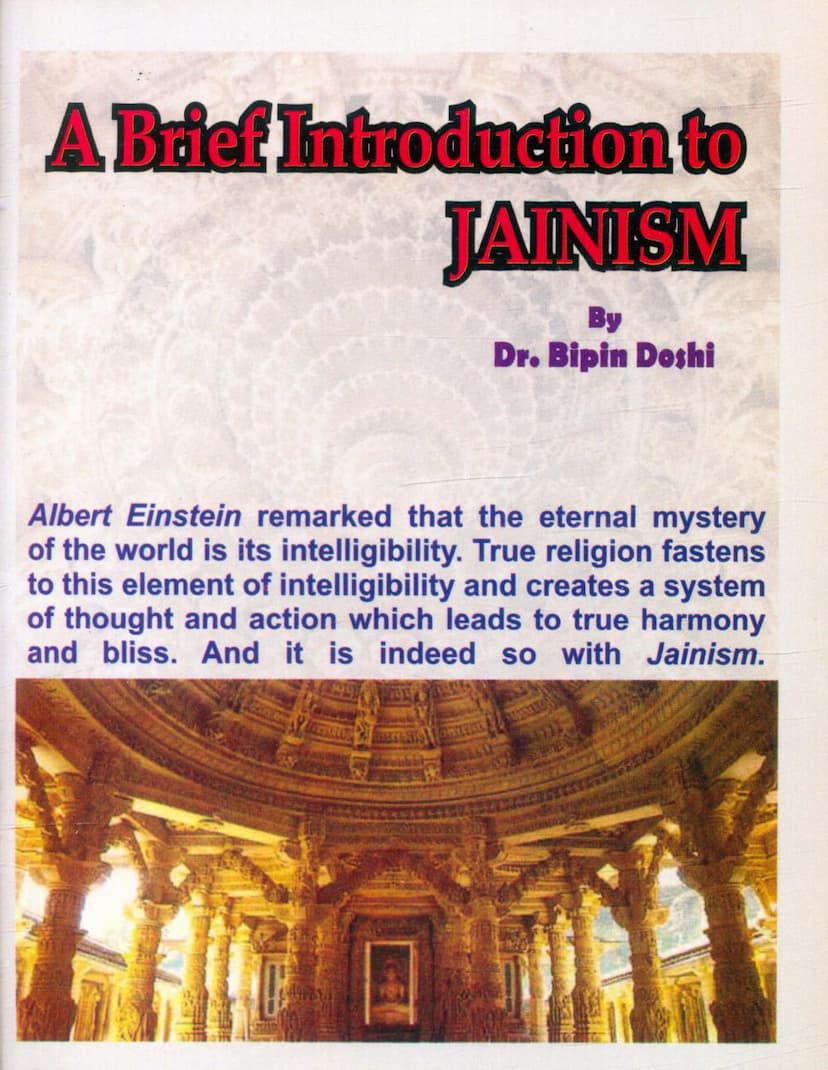Brief Introduction To Jainism
Added to library: September 1, 2025

Summary
Here's a comprehensive summary of "A Brief Introduction to Jainism" by Dr. Bipin Doshi, based on the provided text:
Overview:
"A Brief Introduction to Jainism" by Dr. Bipin Doshi, published by the Jain Academy Educational Research Centre Promotion Trust, aims to provide a concise yet informative overview of the Jain faith. It positions Jainism as a religion focused on intelligibility, leading to harmony and bliss through its system of thought and action. Dr. Doshi, a recognized Jain scholar, emphasizes Jainism's ancient origins and its philosophical underpinnings that resonate with scientific understanding.
Historical Context:
The book places Tirthankar Mahaveer (6th Century BC) within the context of a societal India marked by gender and caste discrimination, slavery, elaborate rituals, animal sacrifice, and socio-economic disparities. It highlights Mahaveer's revolutionary stance against these practices, advocating for gender equality, equality for all irrespective of caste, and the intrinsic value of all living beings, including plants. His strongest opposition was against animal sacrifice.
Core Principles and Concepts:
- Meaning of "Jain": The term "Jain" is derived from "Jina," meaning one who has achieved victory over self-passions like anger, ego, deceit, and greed. Jains follow these Jinas, who are detached, non-possessive, and free from attachment or hatred.
- Tirthankaras: Jainism traces its history through 24 Tirthankaras, with Rishabh as the first and Mahaveera as the last of the current era. Jains worship all 24 Tirthankaras as guides, not as a single creator God.
- Ahimsa (Non-violence): This is the paramount principle of Jainism, symbolized by an open palm with "stop" inscribed. It extends to all living beings (Jivas), including microbes, insects, animals, plants, soil, and water. This comprehensive non-violence has beneficial environmental implications.
- Anekant (Non-absolutism/Multiplicity of Viewpoint): This doctrine emphasizes respecting diverse perspectives and acknowledges that truth is multifaceted. It encourages understanding that no single viewpoint is complete.
- Aparigraha (Non-Possessiveness/Least Possessiveness): Jainism advocates for minimizing material possessions, taking only what is necessary, and sharing wealth. Unchecked possessions are seen as a social evil and religiously wrong.
- Perpetual Happiness: True happiness is achieved by conquering inner enemies (passions) through self-discipline, non-attachment, and a simple lifestyle.
Philosophy of the Soul and Karma:
- Jiva and Karma: Jainism posits two eternal and independent categories: Jiva (the soul, which is intrinsically pure, possessing infinite knowledge, bliss, and energy) and Karma (inanimate, subtle matter).
- Bondage of the Soul: The soul's pure qualities are obstructed by its association with karmic matter, a process likened to gold mixed with impurities.
- Rebirth: Jains believe in the cycle of birth, death, and rebirth across various life forms, determined by past deeds (karma).
- Liberation (Moksha): The ultimate goal is Moksha, achieved by freeing the soul from karmic matter. This is possible only through human life and the practice of the "three jewels": right faith, right knowledge, and right conduct.
- Self-Perfection: Jainism uniquely teaches that individuals can achieve the highest form of purification and become divine themselves through self-effort.
- No Creator God: Jains do not believe in a creator or controller of the universe, viewing it as eternal and governed by its own laws. Divine grace is not a factor in liberation; only self-effort matters.
Practices and Rituals:
- Vegetarianism: Strict vegetarianism is a core practice, stemming from compassion. Jains consume only one-sensed beings (plants) and avoid certain plants (like roots) due to the higher concentration of life within them. Some Jains also support veganism. Strict followers avoid eating after sunset and drink only boiled water. They also refrain from using products derived from animal killing.
- Worship: Jains worship Tirthankaras as inspirational guides towards liberation. The "Navkar Mantra" is a significant daily recitation, honoring liberated souls regardless of their original faith. While many worship idols, some sects emphasize meditation.
- Spiritual Practices: Meditation (Samayik), repentance (Pratikraman), austerities, and fasting are common practices for self-purification.
- Ascetic Vows: Jain ascetics follow five major vows: non-violence, truth, not stealing, celibacy, and non-possession. They observe strict rules regarding travel, food, and living.
- Sallekhana: A unique ritual of holy fasting to death, achieved with dignity and dispassion, leading to a reduction of negative karma.
Sects and Festivals:
- Digambara and Swetambara: The two main denominations. Digambara monks practice nudity, believing it minimizes attachment, and this practice limits full monastic life to males. Swetambara monks and nuns wear white clothes, and believe women can attain liberation.
- Festivals: Jain festivals are characterized by penance, fasting, and scripture study, focused on spiritual intensity rather than entertainment. Paryushana (or Das Lakshana) is a major festival for soul purification.
Contributions and Distinguishing Features:
- Canonical Texts: Jains have numerous canonical texts called "Agamas," based on Mahaveer's teachings, rather than a single holy book.
- Societal Impact: Jains have made significant contributions to Indian literature, languages, philanthropy (education, medicine, animal shelters), art, and architecture. They are known for their business acumen and influence.
- Religious Tolerance: Jainism respects all religions and faiths, adhering to the principle of Anekant. They greet each other with "Jai Jinendra" and bow to all spiritual leaders who have overcome passions.
- Householder Rules: The text outlines 12 rules of conduct (Shravakachar) for householders, emphasizing non-violence in various forms and limiting possessions and activities.
- Book's Purpose: The booklet is intended for visitors to Jain sites and for the younger generation to understand Jainism briefly, promoting the philosophy of non-violence for universal happiness, harmony, and environmental protection.
Key Message:
The book concludes by reiterating that true happiness lies not in external material pursuits but in self-purification and the conquest of inner passions. Blending science and spirituality is presented as the answer to modern-day misery, with non-violence in thought, speech, and action as the supreme universal religion.